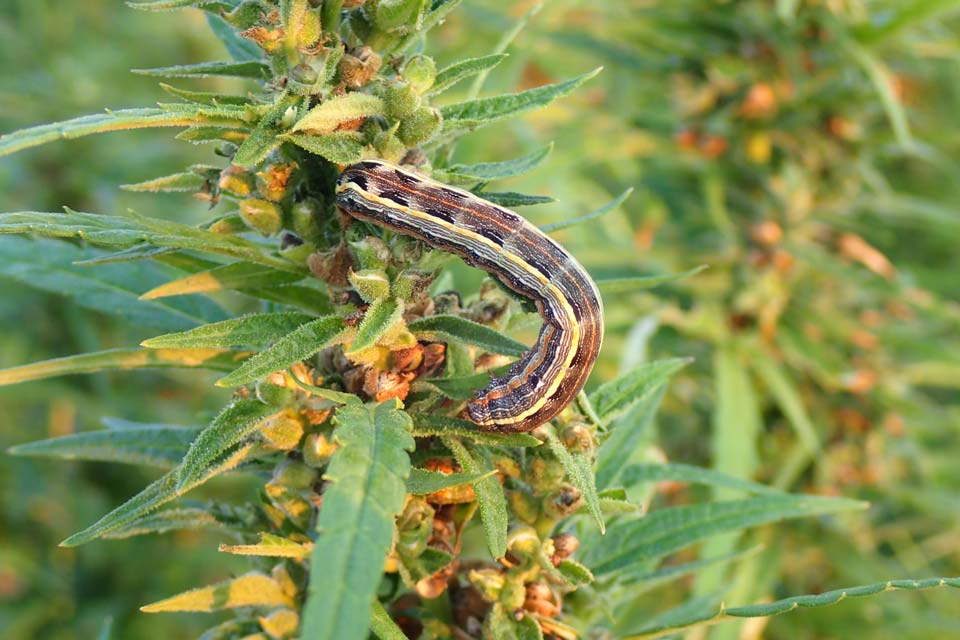Summer is here and the vast majority of hemp fields have been planted. Pests and disease can ruin any agricultural crop, and hemp is no exception. Anyone that has planted hemp commercially knows that we are limited in what we can spray with the confidence of a product labeled by the EPA for use on hemp.
Growers have had to make a frustrating decision: either not spray anything on their crop, with devastating results — or, spray products labeled for organic food crops based on conversations with their-end buyers and product manufacturers.
Fortunately, the situation is improving, as the list of biopesticides labeled for hemp has grown from 0 to 35. Almost all biopesticides are organic, however some formulations are not due to inert ingredients. If you are growing certified organic hemp, check with your certifier before spraying any chemical on your plants.
In this post, we will discuss 3 of the most common pests we have seen in field production of hemp in the Southeastern US since 2018. We will provide a recommendation of an effective labeled product when there is one.
Before we address individual problems, we’ll share some general advice for increasing chances of success when using organic sprays.
General Advice for Hemp Pest & Disease Prevention
Know the pests that are common in your area and order the suggested products before you have the problem. Reacting quickly once a problem is identified, or even acting preventatively, is a key to success with organic products. We like to have certain products on hand so that we are not at the mercy of suppliers and backorders. Waiting 5 days could mean giving the pests or disease time to reach an unmanageable point.
Make sure you store these products according to the label. Organic products are often not shelf stable, especially when stored in high heat or cold.
Keep a close eye on the weaker plants in the field and take some extra time with these plants during routine scouting. Pests are often opportunistic and will attack weak plants first.
That leads us to another piece of advice: routine scouting! Have a scheduled scouting plan and review the data with your team; it is critical to success. “Spray and pray” blindly is not the environmentally or financially responsible way to grow hemp!
3 Most Common Problem Pests & Diseases on Hemp
#1: Hemp Russet Mites

Hemp Russet Mites (HRM) often go undetected before becoming devastatingly brutal. They are microscopic and will crawl all over the plant. Many people misdiagnose HRM initially as a nutrient issue. HRM typically start in the lower portion of the plant and work their way up. To properly scout for this pest you will need at least a 100x scope, our favorite is the Dinolite AM2111. Monitor your fields/growing spaces weekly, especially when the summer heat starts to turn up. It is critical to control HRM before flowering initiation.
The most effective treatment to control HRM we have seen is Micronized Sulfur. When applying wettable sulfur, make sure to use a strong enough sprayer to fully coat the plants making sure to hit the undersides of the leaves. We typically suggest 2 sprays 7-10 days apart from one another. Word of caution, do not spray sulfur 10-14 days before, after or with oil based products as you will see phytotoxicity. Also this should go without saying but read the label prior to using any product to ensure you are using proper PPE and spraying at the proper time of day with the right environmental conditions. Make sure to scout very closely for HRM 3 to 4 weeks before flowering initiates. You do not want to spray sulfur on flowering plants due to the residue it leaves behind.
#2: Armyworms

Armyworms can also be devastating. We watched in horror last year as countless farmers sprayed BT upwards of every two days to no avail. We do believe BT works but spraying after the armyworm population takes off does not work. Most years Armyworm infestations are controlled by natural predators but 2019 was not one of those years in the Southeast. Cool, wet springs tend to lead to bad years for Armyworm infestations because that type of spring weather does not favor the natural predators population growth.
Here is the best advice we can give for controlling Armyworms:Start by putting out moth traps in the field to monitor the moth flight. Also keep your eyes open for moths around the field as this is your first warning sign. This is when you need to start a preventative spray rotation.
We recommend choosing two BT products specific for worms and an azadirachtin product to spray in rotation. Crymax is the first BT product to be labeled by the EPA. BT products are most effective on small, newly hatched larvae.
This is why an early scouting program is crucial. Check with your local extension agent to see when armyworms are normally seen in your area. Once moths and/or worms are present, be sure to stay diligent and do not get comfortable, these pests are persistent.
#3: Fusarium

Fusarium is a soil borne disease. It actually exists all around us but does not take hold unless there is a susceptible host and suitable environmental conditions.
One way to help prevent fusarium from impacting your hemp(apart from keeping your plants healthy) is to introduce and maintain diverse populations of beneficial bacteria in the soil. This can be done by making sure your soil is not too compacted and has organic matter present.
You can also introduce beneficial bacteria such as Trichoderma harzianum into the soil through dripline. If running this product through a drip line make sure you purchase a flowable formulation. This has shown to decrease losses in periods of heavy rainfall where the soil environment is ripe for bad bacterial growth.
——
Always remember to get the pest or pathogen identified before treating. We hope this article helps make your season a little better. We encourage everyone who purchases seeds or clones from us to reach out when experiencing any issues. Hopefully we can at least point you in the right direction.


